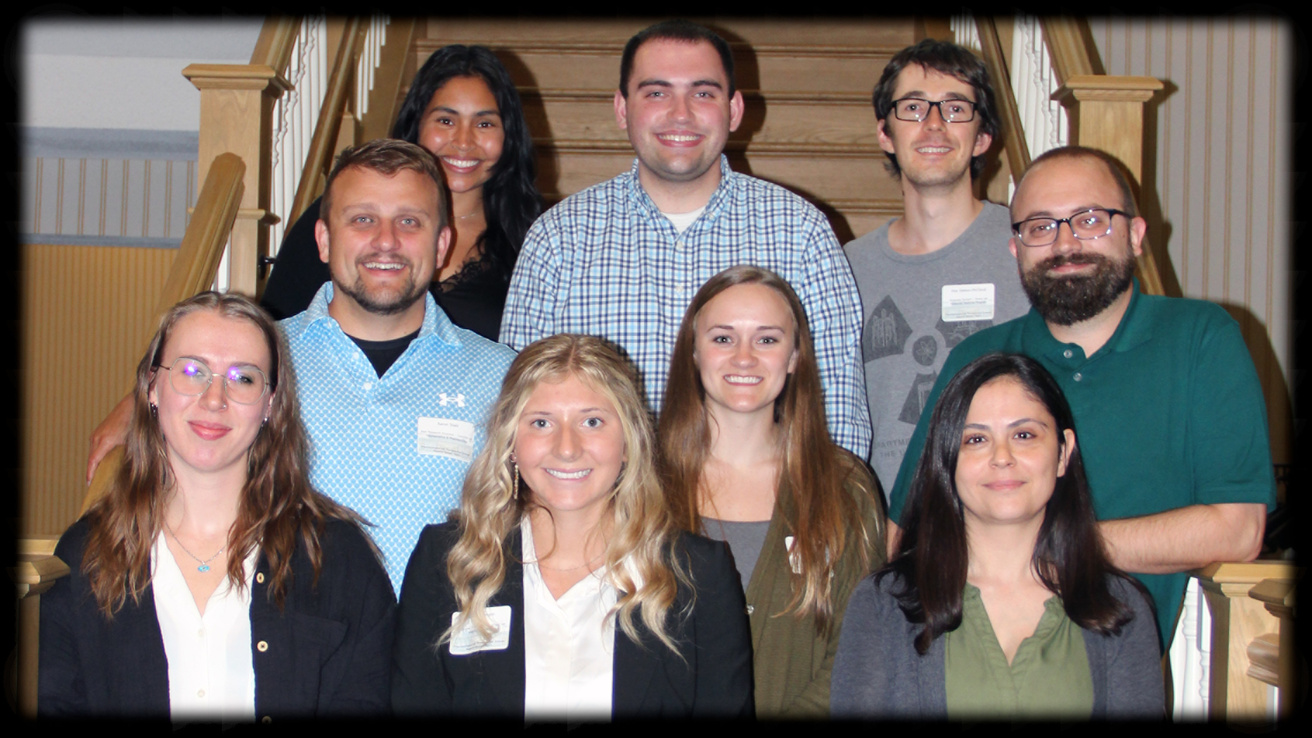The retreat will include oral presentations from our T32 current trainees, faculty talks, and poster presentations by research staff and trainees at all levels. Prizes will be awarded for the top oral and poster presentations. The retreat is an important component of our T32 Training Grant.
Continental breakfast and lunch will be provided.
We look forward to gathering to celebrate research from multiple laboratories!
Stefan Strack, PhD and Dave Roman, PhD
Co-Directors, Pharamcological Sciences Training Program
Agenda
| Time | Topic | Location |
|---|---|---|
| 8:00 - 8:50 AM | Registration and Poster setup Continental Breakfast | Lower level Wayne C |
| 8:50 AM | Welcome and Opening Remarks: Stefan Strack, PhD, Co-Director of T32 | Wayne A/B |
| 9:00 - 10:00 AM | Short Talk Presentations by T32 Trainees (12-minute talks + 3 minutes Q&A) | Wayne A/B |
| 9:00 - 9:10 | Trevor Butler, Neuroscience Graduate Program Mentor: Jon Resch, PhD Leaving the Lamina Terminalis: Investigating Thirst Circuitry Downstream of the Median Preoptic Nucleus | |
| 9:10 - 9:20 | Rachel M. Crawford, Human Toxicology Graduate Program Mentor: Ethan Anderson, PhD Mitochondrial toxicity of catecholamine metabolites in the heart | |
| 9:20 - 9:30 | Logan Dawson, Biochemistry Graduate Program Mentor: Kris DeMali, PhD Mechanisms Coupling Actin Cytoskeletal Reinforcement and Metabolism | |
| 9:30 - 9:40 | Short Break | |
| 9:40 - 9:50 AM | Alexis Ramos, Cancer Biology Graduate Program Mentor: Adam Mailloux, PhD Hypoxia regulates tumor antigen processing machinery | |
| 9:50 - 10:00 AM | Nathan Mohar, Genetics Graduate Program Mentor: Lori Wallrath, PhD DNA sequence variation in SMAD7 enhances LMNA-associated muscular dystrophy in Drosophila models | |
| 10:00 - 10:20 AM | Break & Group Photo | Lower level |
| 10:20 - 11:10 AM | Odd numbered posters present | Lower level |
| 11:10 - 12:00 PM | Even numbered posters present | |
| 12:00 - 1:00 PM | Lunch | Wayne C |
| 1:15 – 1:55 PM | Short talk presentations by T32 Trainees (8-minute talks + 2 minutes Q&A) | Wayne A/B |
| 1:15-1:25 | Angela Smith, Neuroscience Graduate Program Mentor: Kathleen Sluka, PT, PhD The role of spinal dopamine in the transition to chronic pain | |
| 1:25 - 1:35 | Israel Wipf, Cell & Developmental Biology Graduate Program Mentor: Tina Tootle, PhD Defining the Role of Adipose Triglyceride Lipase in Drosophila Border Cell Migration | |
| 1:35 - 1:45 | Josh Lingo, Cancer Biology Graduate Program Mentor: Dawn Quelle, PhD CDK4/6-MEK inhibition in MPNSTs causes plasma cell infiltration, sensitization to PD-L1 blockade, and tumor regression | |
| 1:45 - 1:55 | Miriam McDonough, Molecular Medicine Graduate Program Mentor: Jon Resch, PhD Investigating the molecular mechanisms underlying aldosteronemediated sodium appetite | |
| 2:00 - 2:45 PM | Keynote Speaker (35-minute talk + 10 minute Q&A) Pan Li, PhD, Assistant Professor Dept of Psychiatry and Behavioral Sciences Johns Hopkins University Molecular pathogenesis of spinocerebellar ataxia type 12 | Wayne A/B |
| 3:00 - 3:30 PM | Faculty Short Talks (12-minute talks + 3 minutes Q&A) | Wayne A/B |
| 3:00 - 3:15 PM | Sarah Ferri, PhD Assistant Professor Department of Pediatrics The role of the basolateral amygdala in affiliative social behaviors | |
| 3:15 - 3:30 PM | Kyle Flippo, PhD Assistant Professor Department of Internal Medicine Endocrine regulation of alcohol consumption and fear learning | |
| 3:30 - 3:45 PM | Awards Announcement and Closing Remarks | Wayne A/B |
Keynote Speaker
Pan Li, PhD
Molecular pathogenesis of spinocerebellar ataxia type 12
Dr. Pan Li is currently an Assistant Professor in Division of Neurobiology, Department of Psychiatry and Behavioral Sciences at Johns Hopkins University School of Medicine. Dr. Li obtained her Ph.D. degree in Neuroscience from the Hong Kong University of Science and Technology in 2010, and later received her postdoctoral training at Johns Hopkins Department of Psychiatry and Behavioral Sciences before she joined faculty there in 2018. The research in her lab focuses on the molecular pathogeneses of neurodegenerative disorders such as spinocerebellar ataxia types 2 and 12 (SCA2 and SCA12), and psychiatric disorders such as schizophrenia, with the goal of finding new therapeutic targets. Particular interest includes the molecular biology of disease loci containing expanded microsatellites, the contribution of antisense transcripts to pathogenesis, the role of RNA in neurotoxicity, exosome-based drug delivery, and functional characterization of schizophrenia rare variants.
2023 Awardees
Congratulations to our 2023 Pharmacological and Pharmaceutical Sciences Research Retreat Awardees

First Row: Poster Winners: Anneke Knauss (Research Staff, Tomchik lab), Jasmyn Hoeger (Undergrad student, R. Boudreau lab), Nilly Sayar (Research Staff, Atasoy lab); Second Row: Aaron Stahl (Research Staff, Tomchik lab), Cierra Boyer (Graduate student, S. Stephens lab), Anthony Lange (Postdoc, Tomchik lab); Third Row: Oral Presentaiton Winners: Alexis Ramos (Graduate student, Mailloux lab), Nathan Mohar (Graduate Student, Wallrath lab) also a poster winner and Alex Glebov-McCloud (Strack lab) poster winner. Not pictured: Graduate students Kai Vorhies (Potthoff lab), Valeria Cota (Brogden lab), and Josh Lingo (Quelle lab)